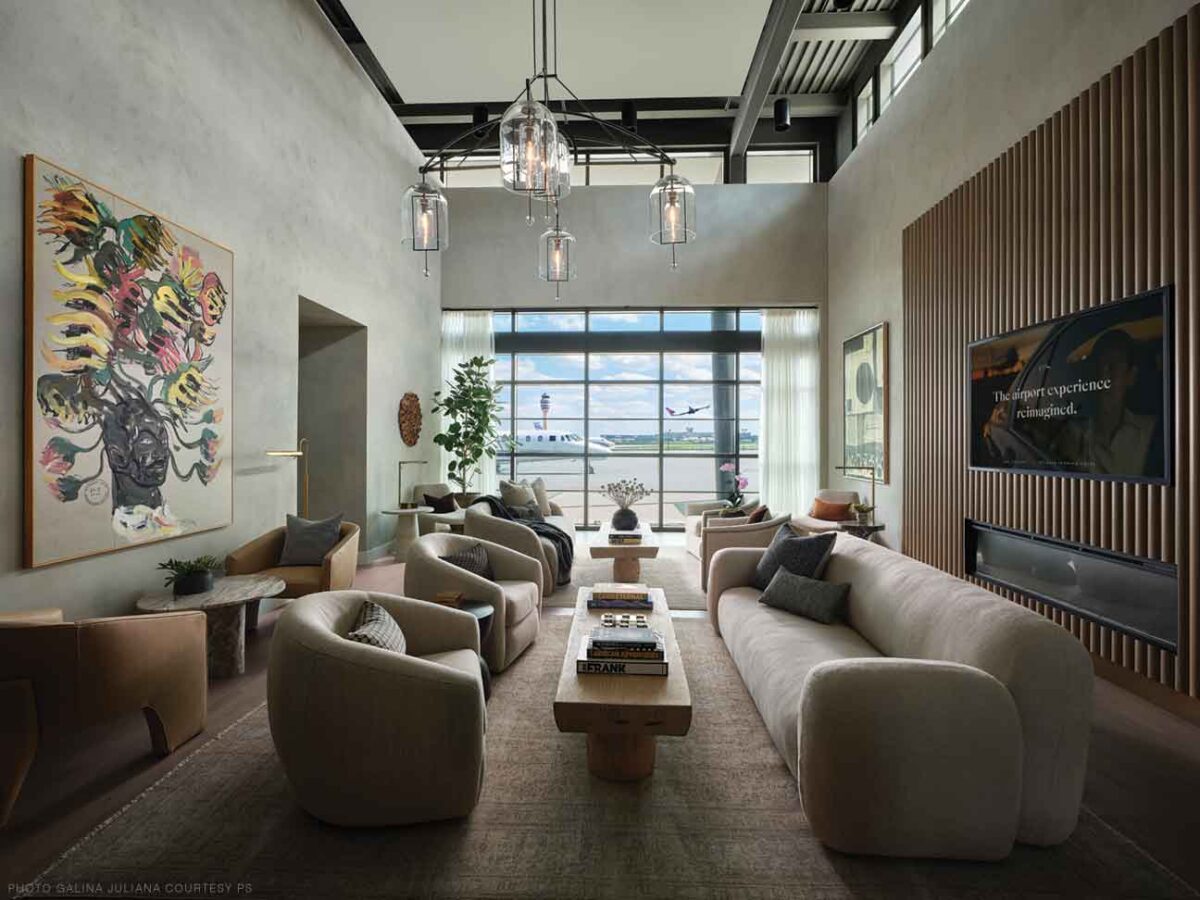
Reimagining the airport experience for premium travelers.
Imagine boarding a commercial flight without having to set foot in the chaotic airport.
PS, a private airline terminal run by Amina Belouizdad Porter WG’13, makes that possible. Already serving travelers in Los Angeles and Atlanta, with Dallas and Miami coming next year, “the goal is to have a PS at every major airport by 2030,” she says.
Customers can either pay around $1,000 to access PS once or pay an annual membership of almost $5,000. For that, they get driven to a secure, industrial location on the perimeter of the airport neighboring maintenance facilities and cargo holds. When they arrive, they are ushered into a luxurious lounge that includes craft cocktails, facials, and lawn games. A staff member takes their IDs and bags, checks them into their flight, and notifies them when it’s time for takeoff, at which point they are taken through security in a private room and driven, via the tarmac, to a commercial plane, whose cabin they board by a staircase instead of the jetway.
Upon landing, the same process happens in reverse. Guests are taken from the plane to the private terminal via the tarmac where someone collects their bags, stamps their passports, and arranges transportation for them while they sip champagne and relax.

“Our customers are not in a resort where they have all the time in the world; they are trying to make a plane,” Porter says. “But we make them feel like they are at that resort.”
Porter didn’t invent this model. In 2018 she was tapped to be the CEO of PS by TPG, a private equity firm based in Texas that had invested in a business that provides security guards to the world’s most influential people. “The founder of that company had seen his clients use a similar service to what is now PS in Heathrow, and he pitched the idea of doing it in the United States,” she explains. “It made sense because in the US, unfortunately, airports have become a security product, not a hospitality product. They are crowded, they are not pleasant experiences.”
With a background in hospitality and real estate—and a hunger to create something new—she felt perfectly placed to lead a new venture. “I am drawn to doing things that have never been done,” she says.
Porter grew up in Algeria but spent most of her formative years in Abu Dhabi. Growing up she always wanted to live and work in the US. “The American dream was real for me,” she says. “I watched Saved by the Bell and Beverly Hills, 90210 and read OK! Magazine and consumed all things American. I knew in my bones I was going to move to the United States.” Still, it took a while.
She got close as an undergraduate at McGill University in Montreal, where her aunt lived. There she studied finance, which “felt like a path that secured your future,” she says. After college, she moved to Shanghai, where she worked as a financial analyst for a hotel investment fund before helping to start URBN, an early boutique hotel in the city. “It was fun to create this category from scratch in China,” she says. “I learned the importance of creating a vibe, for lack of a better word.”
Realizing she didn’t want to stay in China and looking for her next step, she applied to Wharton. “I needed to go somewhere that would polish up my rough edges and give me the language to apply the lessons I already learned,” she says. At Wharton she double majored in real estate and finance, and she served as president of the Wharton Real Estate Club. One of her fondest memories was organizing a trip to Dubai. “I reached out cold to all these Penn alums in the city,” she says. “These were big important people doing big important jobs, and they all responded immediately and enthusiastically and were so happy to host us.”
She also met, for the first time in her life, “her people,” including Alex Sonnenberg WG’12, a former Navy SEAL who soon became her husband. “We met at a Wharton event, and he had such a different life experience than me but was cut from the same cloth,” she says. They moved together to Houston after graduating, and both worked at private equity firms, until he died tragically in 2018 from a wingsuit BASE jumping accident in the French Alps. (Porter is now remarried and has a baby.)
It was during that traumatic time that TGP approached Porter to helm PS. “At that point I needed to throw myself into something new and something hard and all-encompassing,” she says. “They asked if I would move to LA, and I was like, ‘I would move anywhere.’”
Porter quickly learned that it’s complicated to set up a private terminal at airports, which are controlled by various public entities. But she says convincing airports to lease space to her has become easier since they are building a track record in two cities. “The model has been proven, but also the benefits to the airport have been proven,” she says. “Atlanta is a big fan of ours because it elevates them.” For example, she contends, it helped the city win a bid to host 2026 FIFA World Cup games because they could show they could protect and provide for VIPs, dignitaries, and royals.
But even if PS can convince an airport to rent them space for a private terminal, it must be situated perfectly. “The building, by design, has to be consumer facing, because people have to be able to access it from a public road,” she says. “But it also has to back onto a tarmac so we can get people to their planes.” Only an empty space on the edge of an airfield will do.
PS also has to work with TSA and US Customs and Border Protection to set up private spaces where patrons can be screened for security and go through customs when they land. “We fit out the spaces and buy the necessary equipment, and then we reimburse agents for their time,” Porter says. Being able to set up that system required congressional approval, something they achieved in the early stages of the business.
Another piece of the puzzle is working with airlines to be able to check in guests and their luggage and get them onto the airplane. The company works with nearly all major airlines, who Porter says are “happy to let us take care” of hospitality for them and “view us as a halo now because we cater to a very specific, very niche premium traveler.” She says in recent years airlines have grown even more cooperative since they’ve experienced overcrowding in their own VIP airport lounges.
These intricate dynamics are one of the reasons Porter doesn’t expect any competitors in the private airline terminal business for the foreseeable future. With all the stakeholders involved, “it’s a very complex operation,” she says. “It’s funny because the barriers to entry for this business are also the blessings. It would take another player at least five years to catch up to us.”
—Alyson Krueger C’07

